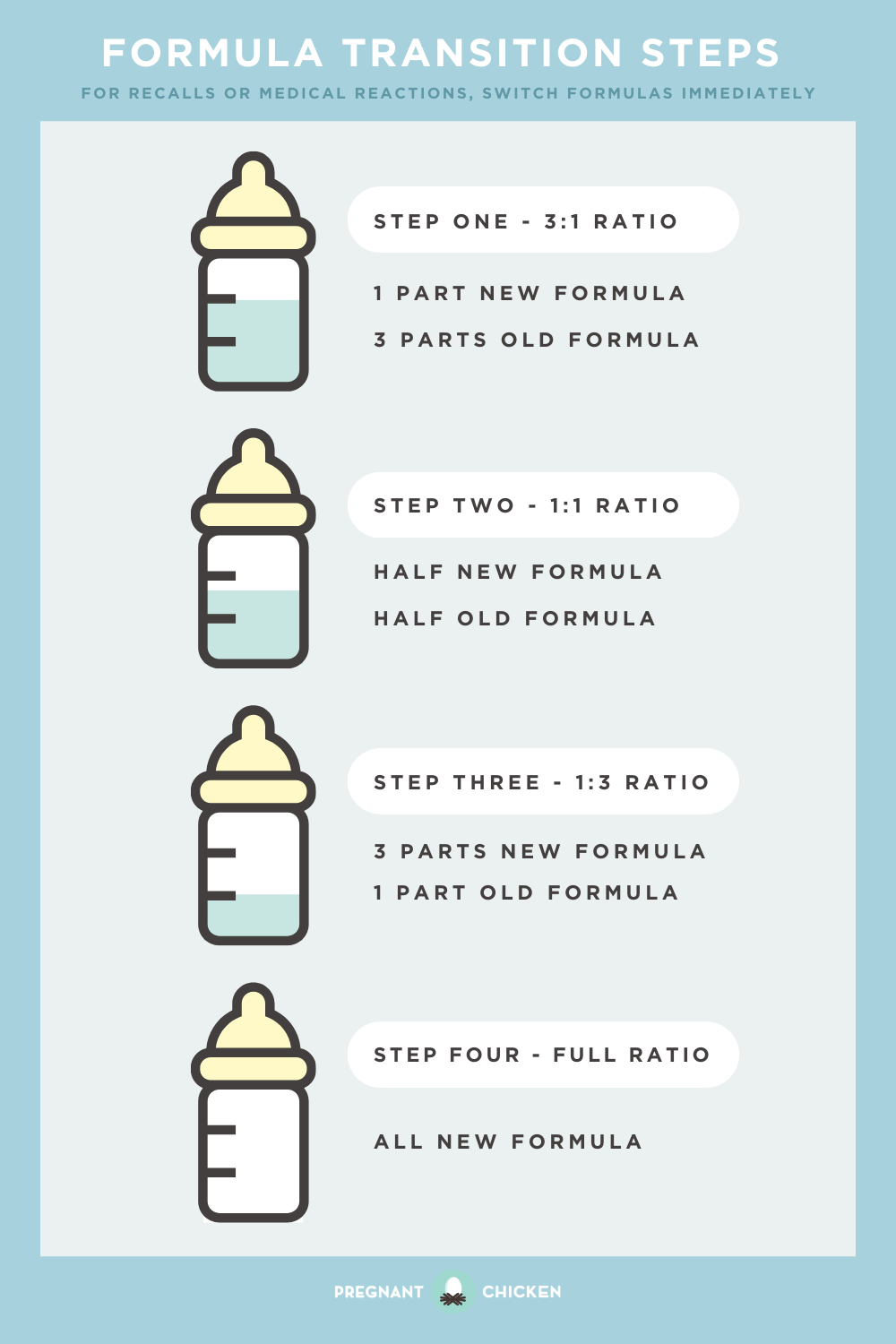There are many reasons a parent might want to switch baby formulas. Sometimes it's because a brand of formula is out of stock or is part of a recent recall. Maybe you want to try organic vs. non-organic, a less expensive product, liquid vs. powder, or you simply want to try a different brand.
Whatever the reason, the bigger question is, how do you do it? Are there risks? Can you just switch cold turkey or should you switch gradually?
I reached out to Dr. Lauren Crosby, a Board certified pediatrician, American Academy of Pediatrics spokesperson, and Bobbie Medical Advisor, to get some answers to common questions and instructions about switching baby formulas so the transition is a smooth one.

How do I know when to switch formulas?
According to Dr. Crosby, you should make the switch ASAP if your baby's formula has been recalled.
If you think your current formula isn't agreeing with your baby, here are some symptoms to watch for. Speak to your pediatrician if you recognize any of the signs below.
- Spitting up more than usual
- Not drinking enough volume
- Hard poops
- Watery poops or diarrhea
- Blood in the stool
- Crying more/more fussiness
- Not sleeping well
- Skin rash or hives
- Excessive gas
Should I discuss formula changes with my pediatrician first?
Yep, you should. Your pediatrician can work with you to figure out what is best for your baby’s specific needs and nutrition.
Can switching formulas hurt my baby?
Generally speaking, no, but it also depends on the reason for the change and what product you're changing to. Problems can crop up if your baby has an intolerance or allergic reaction to a formula, is on a formula that doesn't have DHA, is being given homemade formula (don't do this), or if the new one you're using isn't mixed properly.
How do you switch formulas properly?
Once you've decided to make the switch, there are two ways to approach it.
Transition for a formula recall
If your formula has been recalled you need to make a switch. You can just throw out the recalled formula and start with an equivalent formula ASAP.
Transition for a regular formula switch
If there is no medical reason and your old brand is not on a recall list, a gradual transition is a good idea.
Start by mixing a 3:1 ratio – 3 parts old formula and one part new formula. If the baby drinks it, move to half and half and then a 1:3 ration – 1 part old and 3 parts new. Following that would be a full bottle of the new formula.
If you have a very sensitive baby and access to the product in prior use, you may want to make the above changes a little more gradual – like over 3 days.

When is the best time to switch formulas?
Does it matter what time of day you make the switch? Should your baby be really hungry or not so much? According to Dr. Crosby, earlier in the day is best so you can watch for any reactions and prevent sleep disturbances if the baby is bothered by the new product. That being said, it can take 5 days to be able to tell if a switch is OK.
A hungry baby is more willing to take anything so it won’t hurt to make sure the baby is really ready to eat. (Frankly, I'm the same.)
Do babies notice the difference in formulas?
Some do and some don’t. Older babies meaning 6 months of age or more seem to notice taste differences more than younger infants. Some babies will drink anything.
How long does it take babies to adjust to a new formula?
About a week. Often they get used to a new formula quickly but if they are giving you a hard time, you can wait until they are very hungry and extend the days between mixing old and new formulas during the switch transition plan above.
What are the side effects of switching formulas?
Typically if you’re switching to the same type of formula there shouldn’t be any significant side effects. Some babies are more sensitive to change than others. They might dislike the taste or they might spit up more.
Poop consistency might change and your baby might get constipated, poop more often, have more runny poops, be gassy, or become fussier. It can take a week or so for a baby to adjust to the change but as long as any side effects aren't causing major discomfort, it is ok to give it some time. If you have any concerns, reach out to your baby’s pediatrician, and they will let you know if there is anything to be worried about.
To summarize switching baby formulas
Regardless of whether you’re switching because of a recall, a medical issue, parental preference, or supply problems, it’s generally safe to swap formulas and babies are typically okay with the change. Checking in with your care provider to involve them in the switch is always a good idea and keep an eye on any adverse side effects to make sure the new formula agrees with your baby.
Special thanks to Dr. Lauren Crosby for taking the time to help with this post. You can also check out Switching Baby Formula on Milk Drunk if you'd like even more information.
Our Next Reco: Bobbie Infant Formula: What's the Big Deal About It?




Leave a Comment